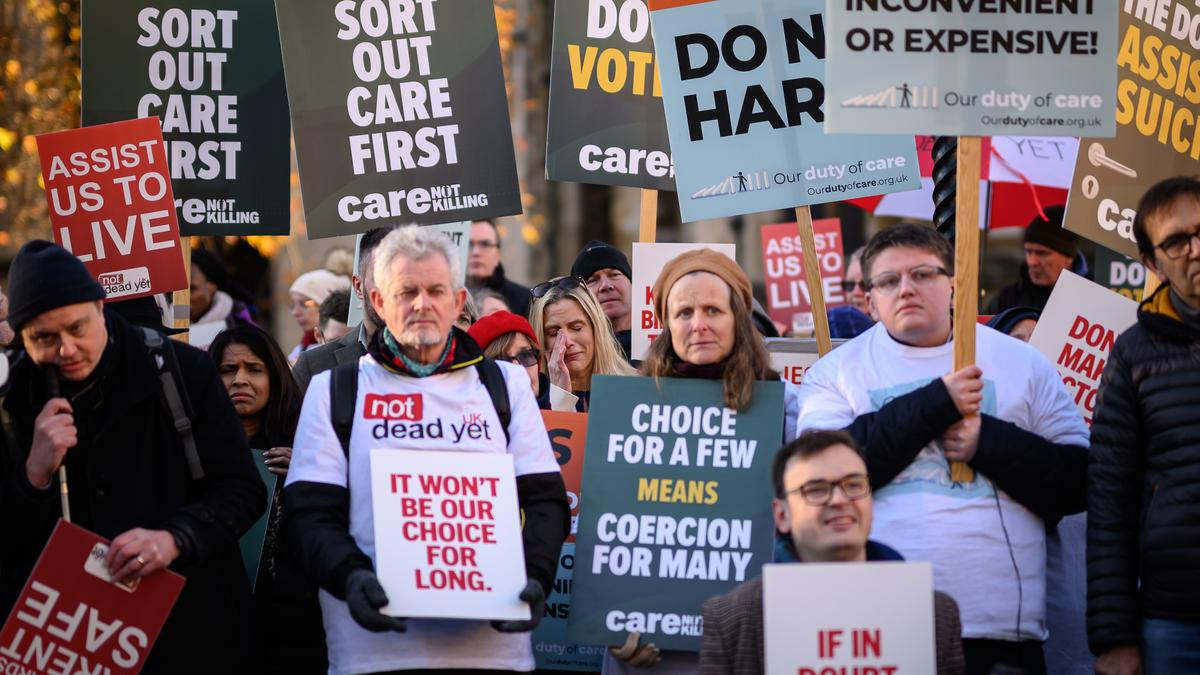A landmark decision by British lawmakers pushes forward the debate on assisted dying, balancing compassion with ethical and legal complexities.
British lawmakers have taken a historic step by advancing the Terminally Ill Adults (End of Life) Bill, a measure that would grant terminally ill patients in England and Wales the legal right to end their lives.
In a closely watched vote, the House of Commons approved the bill 330 to 275, marking a pivotal moment in the long-standing debate over assisted dying in the UK.
While the legislation still faces further scrutiny, its progression reflects a significant shift in public and political attitudes. This blog explores the implications of this bill, the arguments for and against it, and the broader societal impact.
The Path to Legalizing Assisted Dying
The journey to legalize assisted dying in the UK has been fraught with controversy and emotional debate. Currently, assisted suicide is illegal under British law, punishable by up to 14 years in prison.
This legal stance has forced terminally ill patients seeking a dignified end to travel abroad, particularly to Switzerland, where assisted suicide has been legal for over 80 years. The process is not only costly but also physically and emotionally taxing for those already suffering.
The issue gained widespread attention when Esther Rantzen, a beloved British broadcaster diagnosed with lung cancer, publicly stated her intention to seek assisted dying in Switzerland if her condition worsened.
Read : Ukraine Flag Appears on Big Screen During Putin Visit to Kazakhstan: Watch
Rantzen’s story resonated with many, highlighting the ethical dilemma faced by families and the potential legal consequences for loved ones who accompany them.
Read : Why More Than A Fifth Of UK Adults Not Looking For Work
Friday’s vote represents a significant departure from the 2015 decision, where a similar bill was overwhelmingly defeated. The shift in attitudes reflects growing recognition of the challenges faced by terminally ill patients and their families.

Supporters of the bill argue that it offers a compassionate choice for those facing unbearable suffering, allowing them to end their lives with dignity. However, the path to legalization is far from straightforward. The bill will now undergo detailed examination by parliamentary committees, where it will be subject to intense scrutiny and debate.
Arguments for and Against the Bill
The debate over assisted dying is deeply polarized, with passionate arguments on both sides. Proponents believe that the bill represents a humane and compassionate response to terminal illness.
Organizations like Dignity in Dying argue that the current legal framework forces patients to endure unnecessary suffering or seek assistance abroad, often leaving families vulnerable to prosecution.
They contend that allowing assisted dying provides patients with autonomy and control over their final moments, ensuring that they can die with dignity.
Supporters also point to the rigorous safeguards proposed in the bill. Only adults with a terminal diagnosis and a life expectancy of six months or less would be eligible.
Additionally, the process would involve strict oversight to prevent abuse, including multiple assessments to ensure that the patient is making an informed and voluntary decision.
Provisions for stiff prison sentences for those found coercing patients into choosing assisted dying are also included, addressing concerns about potential exploitation.

However, opponents of the bill raise significant ethical and practical concerns. Critics argue that legalizing assisted dying could create a slippery slope, leading to potential abuse and coercion.
Akiko Hart, director of the British human rights group Liberty, expressed concerns about the difficulty of detecting subtle forms of coercion, particularly among vulnerable populations.
The fear is that some patients might feel pressured into choosing assisted dying due to external factors, such as family dynamics or perceived burdens on loved ones.
Another major point of contention is the quality of end-of-life care. Health Secretary Wes Streeting has argued that inadequate palliative care services could influence patients’ decisions.
He believes that improving access to high-quality care should be the priority, ensuring that patients have genuine choices. There are also concerns that legalizing assisted dying might divert resources away from other essential healthcare services, potentially exacerbating existing disparities.
The Broader Societal Impact
The approval of the Terminally Ill Adults (End of Life) Bill has far-reaching implications beyond the immediate legal and medical considerations. It raises profound questions about the value of life, individual autonomy, and the role of the state in personal decisions. As British society grapples with these issues, the debate reflects broader trends seen in other countries that have legalized assisted dying.
In Europe, countries like Switzerland, Austria, and Belgium have implemented laws allowing medically-assisted death, each with its own set of safeguards and regulations. These countries provide valuable case studies for the UK, offering insights into the practical and ethical challenges involved.

In the United States, assisted dying is legal in 10 states and the District of Columbia, with ongoing debates about expanding access. The UK’s decision will likely influence similar discussions in other countries, setting a precedent for how democracies balance compassion with ethical responsibility.
The societal impact also extends to healthcare professionals, who would play a critical role in implementing the legislation. The bill raises complex questions about the role of doctors and nurses in end-of-life care.
While some healthcare workers support the right to assisted dying, others express concerns about the ethical implications and the potential impact on the doctor-patient relationship. Training and support for medical professionals will be crucial to ensuring that the process is carried out with compassion and integrity.
Public opinion in the UK is also divided, reflecting the complexity of the issue. Surveys suggest that a majority of Britons support the principle of assisted dying, particularly when strict safeguards are in place.
However, the emotional and moral dimensions of the debate mean that consensus remains elusive. The ongoing parliamentary process will provide an opportunity for further public engagement, allowing different voices to be heard.
A Turning Point for the UK?
The advancement of the Terminally Ill Adults (End of Life) Bill marks a significant moment in the UK’s ongoing debate over assisted dying. While the legislation still faces considerable hurdles, its progression reflects a growing recognition of the challenges faced by terminally ill patients and their families.
The debate is far from over, with passionate arguments on both sides highlighting the ethical, legal, and practical complexities involved.
As the bill moves through the parliamentary process, it will be subject to intense scrutiny and debate. Lawmakers must carefully consider the potential risks and benefits, ensuring that any legislation provides robust safeguards while respecting individual autonomy.
For British society, the outcome of this debate will have profound implications, shaping the future of end-of-life care and the broader conversation about compassion, dignity, and choice.
The journey to legalize assisted dying is a complex and emotional one, reflecting the fundamental questions we face about life and death. Regardless of the outcome, the debate has already sparked a much-needed conversation about how we care for the terminally ill and the values that define us as a society.

